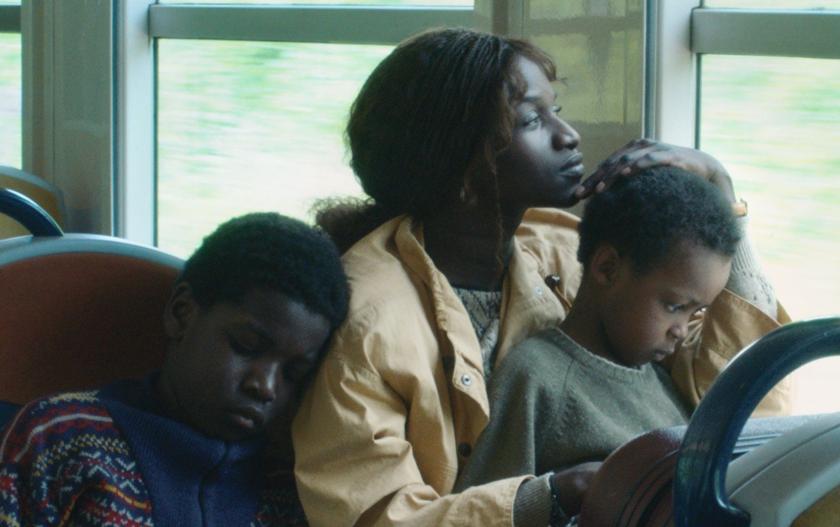In French, this film is called Un petit frère (“A little brother”), and for once it may be that a film’s English title is an improvement on the original. The fitful and fragmented second feature by Léonor Serraille is about a multi-tasking migrant from Ivory Coast and her two sons, whom we drop in on at intervals across 20 years or so, beginning in 1989.
They start out with relatives in Paris as Rose (Annabelle Lengronne) rallies ten-year-old Jean (Sidy Fofana) and five-year-old Ernest (Milan Doucansi) to do well at school. Two other children have been left behind in Abidjan. Rose must also fend off the romantic moves of local smoothie poetaster Jules (Jean-Christophe Folly), who styles himself “Julius Caesar”.
But before long she’s juggling her job as a hotel maid with seeing a slew of other boyfriends and weeping alone on the floor next to filched boxes of chocolates. The film doesn’t want to pass judgment on the topic of frantic dating while mothering, and thanks to Lengronne’s enigmatic performance – fierce and fragile, present and distant – she carries us along while we wait, largely in vain, for the story to gather steam.
In the oddest of several sidebar moments, Rose and other hotel staff are invited to the stately home of the hotel’s daffy owner, who offers them a weekend of hunting, raving, and group sex. It’s as if he’s one of the nutcases in Private Eye’s “From the Message Boards” parody of life online.
 The other men of the film are averagely considerate by global standards – that is, faithless bastards on most subjective scales. One of Rose’s pick-ups, a lumpen middle-aged white guy called Thierry (Thibaut Evrard), persuades her and the kids to go to Rouen on his behalf, which jumps us into a second phase. Here we find the now-19-year-old Jean (Stéphane Bak) squandering his early school promise and going slowly off the rails – all the while looking after Ernest and, bizarrely enough, going clubbing with his ma. (Pictured above: Stéphane Bak, Annabelle Lengronne)
The other men of the film are averagely considerate by global standards – that is, faithless bastards on most subjective scales. One of Rose’s pick-ups, a lumpen middle-aged white guy called Thierry (Thibaut Evrard), persuades her and the kids to go to Rouen on his behalf, which jumps us into a second phase. Here we find the now-19-year-old Jean (Stéphane Bak) squandering his early school promise and going slowly off the rails – all the while looking after Ernest and, bizarrely enough, going clubbing with his ma. (Pictured above: Stéphane Bak, Annabelle Lengronne)
For slightly unclear reasons, Rose is absent from their yellowing flat for most of the week. She’s more careworn now, her teenagery spirit dampened, and in the nearest thing to a climactic scene Jean has a disastrous physical set-to with the love-slug Thierry.
Then, during something of an afterword, we hop onwards to watch the adult Ernest (Ahmed Sylla) tutoring sixth-formers in the philosophy of Pascal, as they sit round mulling time, death, existence, and the rest – probably as much a fetish scene in French movies as car chases are in American ones. And the French equivalent of a feel-good ending is delivered in a final encounter between Ernest and Rose, if we allow “feel-good” to include a healthy splodge of ennui.
At one point the melancholy Ernest is hassled by the cops, who call him “Mr Obama”, but race, class, and systems of money are only touched on lightly in the film, even as characters yearn for Africa. In this delicate, well-acted follow-up to Jeune femme (2017), Serraille seems overly polite toward her central family, perhaps inevitably as a white filmmaker.
The excellent Lengronne as the hedonistic good mother Rose creates a character that’s constantly reaching out for something only she knows. She mirrors the randomised nature of the movie itself, its DNA leading all the way back to the New Wave – digressive, adrift in time, heritage-conscious, anti-moralistic, a bit unhinged. As for the brothers, little and large, they spend most of the film lost in the great fruitless challenge of any son – trying to figure a mother out.















Add comment